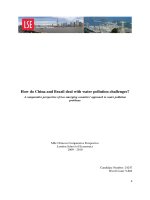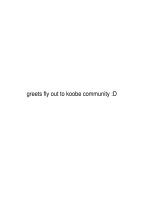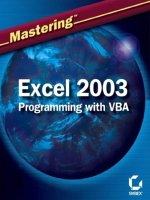112 HSE interview questions with answers · version 1 pdf
Bạn đang xem bản rút gọn của tài liệu. Xem và tải ngay bản đầy đủ của tài liệu tại đây (6.86 MB, 138 trang )
FREE EBOOK:
112
HSE
interview questions & answers
1
Based on:
Top 10 HSE interview questions and answers
Updated To: Top 112 HSE interview questions and answers
On:
Mar 2017
2
This ebook consists of two parts:
- Part I: Top 112 HSE interview questions and answers (pdf, free download)
- Part II: Top 12 tips to prepare for HSE interview
3
Top materials for job interviews:
In this document, you can refer to materials for a HSE interview such as:
HSE situational interview, HSE behavioral interview, HSE interview
thank you letter…
Other useful materials for a successful HSE interview:
1. Ebook: Job Interview Questions &Answers by Bob Firestone
Download link: click here, full ebook review click here
2. />,
3. interviewquestions360.com/free-ebook-145-interview-questions-andanswers
4. />4
1. Tell me about yourself?
It seems like an easy interview question. It's open ended: ”I can talk about
whatever I want from the birth canal forward. Right?”
Wrong. What the hiring manager really wants is a quick, two- to threeminute snapshot of who you are and why you're the best candidate for this
position.
So as you answer this question, talk about what
you've done to prepare yourself to be the very
best candidate for the position. Use an example
or two to back it up. Then ask if they would like
more details. If they do, keep giving them
example after example of your background and
experience. Always point back to an example
when you have the opportunity.
"Tell me about yourself" does not mean tell
me everything. Just tell me what makes you
the best and fit the job requirements
Related post: Tips to answer question: tell me about your self?
/>your-self.html
2. What is HSE tag?
HSE tag can be defined a surface made of
card board or paper board on which
English local languages letters written for
warning HSE instructions to employees.
6
3. Where do you see yourself in five years’ time?
What the interviewer really wants is to see that
you’ve thought about your future, and gauge your
ambition. They also want to verify that this isn’t just
a stop gap position.
Although all of your answers should be tailored to
the organization and position you’ve applied for, this
is especially the case with this question. If you’re
going for an entry level position, for example,
explain how you’d like your career to progress (e.g. ‘I’d like to progress to a
Senior Software Engineer’ or ‘I see myself being a team leader…’).
If you’re going for a more senior position, explain how you’d be looking to
move the company forward. Have a look at their business strategy or corporate
objectives before the interview, and explain how you can help in achieving
them.
Related post: Tips to answer question: what about your career goals?
/>career.html
4. what is emergency planning?
Emergency planning can defined as a
control measurer. It can control the
accidents safe guard people and
provide information to media.
8
5. What is your greatest weakness?
"What are your weaknesses" is one
of the most popular questions
interviewers ask. It is also the most
dreaded question of all. Handle it by
minimizing your weakness and
emphasizing your strengths. Stay
away from personal qualities and
concentrate on professional traits: "I
am always working on improving
my communication skills to be a
more effective presenter. I recently
joined Toastmasters, which I find
very helpful."
Related post: Tips to answer question: What is your greatest weakness?
/>
9
5. What is your greatest weakness? (continue…)
Tips to answer this question:
• Show that you are aware of your
weakness and what you have done to
overcome it.
• Show that you are “self-aware” and that
you have the ability to take steps to
improve yourself.
• Don’t you DARE answer with the cliche
“I’m a perfectionist” answer or any other
such answer that the hiring manager can
see right through.
• Don’t highlight a weakness that is a core
competency of the job. (Know the job
description “inside and out”.)
• Don’t dodge this question.
10
6. What is work permit system?
Work permit system is a “ written
documents” for permission to
undertake a job by area in charge or it
is written document issued by the area
in charge to the performer to under
take the specific job.
11
7. What is your greatest strength?
This is your time to shine. Just
remember the interviewer is looking
for work related strengths. Mention a
number of them such as being a good
motivator, problem solver, performing
well under pressure, being loyal,
having a positive attitude, eager to
learn, taking initiative and attention to
detail. Whichever you go for, be
prepared to give examples that
illustrate this particular skill.
Related post: Tips to answer question: What is your greatest strength?
/>12
8. What is confined space?
An area which is small and enclosed or
an area where one entry and exits or
where a man cannot work comfortable in
any location is caused confined space.
13
9. Why did you leave your last job?
Here you will need to be careful as
there are many possible answers you
could use, just remember to NEVER
talk negatively about any prior or
current employer to a potential
employer. No one wants to think that
in a few years’ time you could be
saying the same about them. A
possible reason could be to say you
were looking for better opportunities,
for you to grow professionally, or you
were looking for the chance to work
abroad.
Useful material: Top 16 ways to make money forever
/>14
10. What is sand blasting?
The process of removing rust dust,
dirt, scales and old prints from the old
surface using compressed air is called
sand blasting.
15
11. Why should we hire you?
This is a differentiation question.
What you want to tell them is:
they'd be crazy not to they hire
you.
Focus on them: You need to only
share how you meet almost all the
criteria they seek, and also have
two to three additional abilities
that they might not even know
they need…yet. They need to
know you are a candidate who can
not only meet their needs now, but
will also be valuable for where
they want to go in the future.
16
11. Why should we hire you? (con…)
Are they likely to need another
skill set as they grow as a
company?
Or maybe you have skills that you
noticed are in another job
description they are looking to
fill?
You can help out with those
deliverables until they find
someone (or be a backup to the
person they hire).
Have you been down a path
already that they are currently
starting? Having “lessons learned”
to offer them is a very strong plus
for a job candidate.
17
12. What is LEL?
The minimum concentration of
vapour, gasses and dust in air below
which propagation of flame does not
occur on contact with a source of
ignition is called LEL.
18
13. What is your greatest accomplishment?
This is somewhat similar to the “what
is your greatest strength?” question
and can be handled along the same
lines. You want to pick an
accomplishment that shows you have
the qualities that the company puts
value in and that are desirable for the
position you’re interviewing for.
The fact is you may have several
accomplishments you could pick
from. Pick one that will have the most
impact.
Useful material: Top 12 skills for career success
/>19
13. What is your greatest accomplishment? (continue)
Tips to answer this question:
- Talk about an accomplishment that
exhibits how you will be a perfect fit for the
company and for the position you’re
interviewing for.
- Try and show some genuine passion when
you’re talking about your accomplishment.
- Don’t fall into the trap of thinking your
accomplishment is “too small”. The fact is,
relating a small accomplishment that is
inline with “what the company values” can
be more powerful than an unrelated
accomplishment.
Useful material: Top 9 ways to become a millionaire
/>
20
14. What is UEL?
The maximum proporation of vapour,
gasses and dust in air above which
proposal the flame does not occur on
contact with a source of ignition is
called UEL.
21
15. What can we expect from you in your first 90 days?
Ideally the answer to this should
come from the employer: they
should have plans and
expectations for you.
But if you're asked, use this
general framework:
• You'll work hard to determine
how your job creates value -you won't just stay busy, you'll
stay busy doing the right things.
• You'll learn how to serve all
your constituents -- your boss,
your employees, your peers,
your customers and suppliers
and vendors...
22
15. What can we expect from you in your first 90 days?
(con…)
• You'll focus on doing what you do
best -- you'll be hired because you
bring certain skills, and you'll
apply those skills to make things
happen.
• You'll make a difference -- with
customers, with other employees,
to bring enthusiasm and focus and
a sense of commitment and
teamwork...
• Then just layer in specifics that are
applicable to you and the job.
23
16. What is personal protective equipment?
It is an equipments used to project the
person from hazards such dust, dirt,
fumes and sparks etc. It is the barrier
between hazard and person.
24
17. What are your salary expectations?
When completing your preparations for the interview, always have this
question in the back of your mind.
Have a look at the average salary for someone in this industry, area, and
who possesses similar skills to yourself, and you should get a basic idea.
But remember: this is only the first interview. You haven’t been offered
the job. There’s no need at this stage to be try and begin negotiations.
Giving a broad salary range will usually be enough to move on, but be
prepared to back it up if you need to.
Just don’t be tempted to sell yourself short. If you’re not sure where to
start, take a look at our average salary checker.
Right answer: A broad (but realistic) answer e.g. ‘I‘m looking for a
starting salary somewhere between £25,000 and £30,000’
Wrong answer: ‘I’m not sure. How much are you on?’
Useful material: />
25









